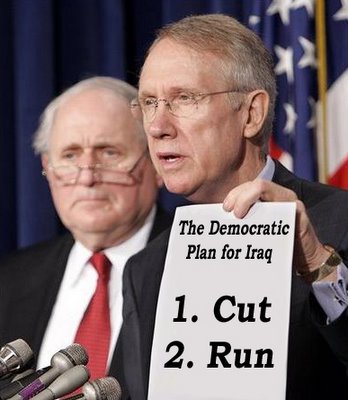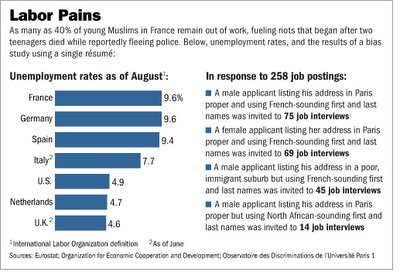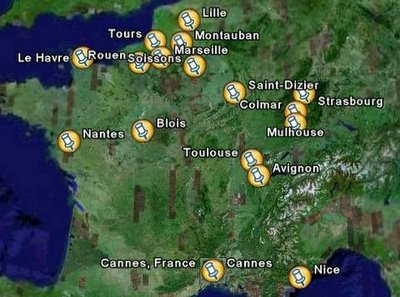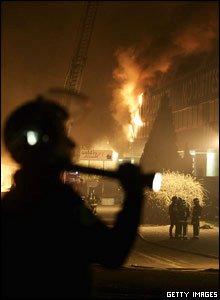
My result is this:
 Explanation for the different parties is here.
Explanation for the different parties is here.Funny my result but note that it is only 56% match.
party of islamic virtue (fadhila)
حزب الفضيلة الإسلامية
(Hizb al-Fadhila al-Islamiyah)
History: After the 2003 Iraq War, when many Shi’ite scholars returned to Najaf and Karbala, Muhammad al-Ya’qubi pesonal profile here), who had studied with Muhammad Sadiq al-Sadr, disputed the direction of the Sadrist Movement with Muqtada al-Sadr, and split off to establish the Hizb al-Fadhila al-Islamiyah. He has the support of Qom-based Grand Ayatollah Kadhim al-Ha’iri. In the Jan 2005 parliamentary elections the party achieved 28 seats in the TNA (within the United Iraqi Alliance), as well as representation in the Baghdad, Karbala, Najaf, Al-Qadisiyah, Maysan, Dhi Qar, Al-Muthanna, and Basra provincial councils.
Current leader: Ayatollah Shaykh Muhammad al-Ya’qubi (Najaf)
Goals:
- Guaranteeing freedom and prosperity to the Iraqi society in accordance with Shari’a standards
- Spreading intellectual and political awareness among the Iraqis and deepening awareness of their religion and homeland
- Leading the Iraqis toward an integration of consciousness and belief on their way to a better moral and material future, in a society enjoying freedom, justice, and independence
Desired political system: A constitutional, parliamentary, pluralistic system that is founded on elections, and limited by Shari’a. Federalism is not preferred but might be the best solution at this time.
Liberties & civil rights: “The constitution must guarantee human rights and the basic freedoms, which do not contradict the Islamic Shari’a and common customs.” Human rights should be guaranteed “in a manner that does not distort the nature of Iraqi society and the commandments of Islam, the true religion.”
Distribution of wealth: “The entirety of natural resources belongs to the public sector. [...] All movable assets attained from natural resources can be acquired only through labor. They can also be acquired through inheritance, indemnity for damages, and other forms of acquisition.”
Law & judiciary: The source of laws is the Shari’a, or at least the laws should not contradict it.
De-Ba’thification:
- Ba’thists who committed crimes against the Iraqi people must be prosecuted by law and justly penalized.
- Ba’thists who did not commit any crime against the Iraqi people should be slowly re-integrated into Iraq’s political life
Iraq’s identity: “The land and people of Iraq must remain unified. [...] Iraq belongs to all Iraqis. [...] The constitution must emphasize the Islamic identity of the country.”
Kurds and minorities:
- The party “believes in the cultural and national rights of the Kurds in a way that harmonizes with their circumstances and fits into the framework of a unified Iraq, in which Arabs and Kurds live in brotherhood and share equal rights of citizenship and equal and equivalent obligations.”
- The party does not like to use the term “minority”. All are Iraqis and have equal rights and obligations.
On terrorism: “[The] terrorism that broke out in Iraqi society was not a product of current confessional or intellectual preconditions in Iraq. It is rather a phenomenon that grew up outside Iraq and crept into Iraq within the range of regional and international interests. [...] The Shari’a forbids terrorism.”
On the occupation: “[It] is a comprehensive project of Western civilizing procedures aimed at changing ways of thinking and the present culture, in Iraq in particular and in the whole Middle East in general.” It needs to be unmasked and resisted, but in a planned and scientific manner. Both violent and non-violent resistance are important.
Regional/International relations:
- Foreign policy should be based on the Arabic and Islamic affiliation of Iraq.
- Especially friendly relations should be established with Iraq’s neighbors.
- Relations should be maintained with all countries except Israel.
My only issue with them is the over reliance on sharia. Taken in itself i do not think sharia as originally intended is bad, but as applied by men (against women in particular) it is no good. But using a religious belief as a basis for governance at least inject some sort of morality and would be better than a Godless system.
patriotic union of kurdistan (puk)
الاتحاد الوطني الكردستاني
Establishment:
The Patriotic Union of Kurdistan (PUK) was established on 1 June 1975 after the collapse of the KDP-led Kurdish resistance as a result of the Algiers Agreement between Iraq and the Shah of Iran. The party was formed as a union of three political groups: the Kurdish Workers League, the Socialist Kurdish Movement and the Social Democratic Movement under the leadership of Jalal Talabani.
Party history:
The party continued its armed activities against the Saddam Hussein regime until the 1991 uprising which followed the Gulf War, with the exception of a period in 1983 when the party negotiated with the regime. After the 1991 uprising and the establishment of the so-called "secure area" by the coalition forces, the PUK was one of the two powers administering the Kurdish areas - equally with the KDP. After clashes between the two parties erupted in 1994, the PUK gained control over the areas of the Sulaymaniya region and some areas of Arbil and Kirkuk regions, which are the areas that traditionally had been under its influence.
During the 1992 General Party Congress in Arbil, the Party decided to transform its political agenda from a Marxist-socialist to a democratic socialist one. This transformation came in response to the changes that took place in the international political situation after the fall of the USSR and its allies.
Current leader: Jalal Talabani has been the General Secretary of the party since its establishment. For a long time he had been a member in the Kurdistan Democratic Party. He participated in the Iraqi Interim Governing Council and was elected President of Iraq on 6 April 2005.
Goals: "The PUK is a socialist, democratic organization struggling for peace, democracy, freedom, equality and against dictatorship, occupation, aggression, nationalistic, denominational, and religious persecution, violation of human rights , ethnic cleansing, racism, terrorism, and reactionism. It struggles for the right of self -determination, solidarity, and peaceful coexistence."
System of governance:
- The establishment of a federal, parliamentarian, democratic, pluralistic system based on nationalistic and geographical bases
- Islam is the religion of the state and must influence its laws, but there will not be an Islamic government.
Liberties & civil rights: The party is committed to the International Declaration of Human Rights and to all international conventions related to human rights.
Capital punishment: The PUK is a member of the Socialist International, which is against capital punishment.
Distribution of wealth: Distribution of oil and gas by consensus between the regions and the central government.
Iraq’s identity: Iraq is a multi-national and multi-religious country. The Arabs are part of the Arab world, and the Kurds are part of Greater Kurdistan. Kurds have their own cultural and political identity.
Kirkuk: The party considers Kirkuk within the geographical borders of the Kurdistan Region and that the solution of this issue will be according to Article 58 of the TAL, meaning first normalization and then determination of the fate of the city.
De-Ba'thification: Previous members of the Ba'th Party should be allowed to hold civil and administrative jobs, but they cannot join the armed or security forces.
On terrorism:
- "The armed insurrection movement in our country can be put down if Kurdish and Shi'ite militias are employed.
- The Iraqi insurgents are divided into two groups. The first are the orphans of Saddam, with whom it is not possible to negotiate because they dream of bringing Saddam's regime back to power, and this is impossible. The Iraqis struggled for years to bring down this regime, and it is impossible to allow it to come to power again. The second group consists of some patriotic and Islamic persons who have been upset by what has happened. It is possible to negotiate with them and reach an agreement to involve them in the political process."
On militias: The Peshmerga forces and the Badr Corps are not considered militias.
On the occupation: There is no occupation, but a war of liberation.
Media: http://www.kurdsat.org
Socialist? No death penalty? Militias?
A blend of the two would have worked for me after addressing these concerns. Now these guys seem alright to me and i wonder how they will do:
iraqi national conference (inc)I don't really see much difference between the puk, kdp, or the itf. Having political parties based on ethnicity is fairly stupid imo.
حزب المؤتمر الوطني العراقي
Established: 1992
Current leader: Ahmad Jallabi (President - personal profile here)
System of governance:
-A democratic federal system, with a rejection of a religious (denominational) or non-religious quota. The political majority is determined by means of elections and not by means of population statistics.
-Federalism is the best system because it meets the needs and requirements of every region and group in a more accurate and effective way.
Liberties and civil rights: One of the party's principles is the priority given to the respect of the individual over the respect of religious groups, sects, and tribes.
Iraq’s identity: Iraq has an Arab face, but it also prides itself on its other features. Iraq is an Islamic country even though the party prefers the non-interference of the religious leaders in ruling the country.
De-Ba'thification: The party is one of the groups which established the De-Ba'thification Committee. It declares, "The new Iraqi government should acknowledge the fact that the first enemy of the new Iraq is the Ba'th organization, and that it should adopt steps to implement its eradication." (There must be a consensus and a national dialogue and openness regarding the criteria for pardon and forgiveness from which everyone that joined the party in the previous era may benefit, whether they joined under duress or voluntarily.)
On the occupation:
- Drawing up a timetable for the withdrawal of the multi-national forces from Iraq is a central goal of the party.
- The INC considers what happened in Iraq in Spring 2003 to be an act of liberation. Jallabi approves the security support which the coalition forces give to the Iraqi security forces.
On terrorism: The party puts a lot of responsibility on the neighboring countries for the deteriorating security situation in Iraq. It believes that international Islamic terrorism has come to Iraq from the outside. The party considers dialogue with the followers of Al-Sadr a necessity while it rejects dialogue with the followers of the Ba'th and calls for fighting and punishing them.
International relations: The party is committed to the principle of non-interference and asks the neighboring countries to shoulder their responsibility in standing against the smuggling of arms and terrorists into Iraq.
kurdistan democratic party (kdp)
الحزب الديمقراطي الكردستاني
Establishment: The party was established on 16 September 1946 in Iran under the leadership of Mullah Mustafa Barzani. Other co-founders were important Kurdish leaders such as Mustafa Khushnaw, Mir Hajj, Muhammad Qudsi and Hamza Abdullah.
Current leader: Mas'ud Barzani
System of governance: Multi-federal, democratic, federal (essentially), provided the federation is established based on nationalist and geographic principals.
Liberties & civil rights:
- The party believes in the freedom of publishing, press, and media. It emphasizes its active role as a fourth power in educating the society and in carrying the voice of the Kurdish people to the world.
- There must be public and personal freedoms.
- Democracy is part of the party’s philosophy, nonetheless many criticized the coalition between the Kurdistan Democratic Party and the Patriotic Union of Kurdistan at the Kurdistan government elections level for it oppressed the healthy democratic competition within the region.
Minorities’ rights:
- The party’s relationships with the small minorities are excellent, like the different Christian and Muslim minorities, their rights and particularities were protected in the Kurdistan Region. Even the representation of some of them, particularly the Christian minority, in the Kurdish administration and political institutions was bigger than its actual percentage in the population. Protecting the (small) minorities is one of the party’s main policies.
The Turkmen-Kurdish and Arab-Kurdish relations in Kirkuk became tense when the Kurdish parties held that a referendum on the fate of the city should include the original inhabitants that had been expelled by the previous Ba'th regime to Arabize the city. The party sees that the Arabizing process carried out by the previous regime in some areas should be reversed by evacuating the Arab (non-original) inhabitants and procuring the properties of the Kurds who originally lived there.
Law & judiciary:
- The judiciary and its independence is respected. All available judiciary guarantees are emphasized.
- Islam is considered as the main source for legislations but not the only source.
Distribution of wealth: Each region has a share in the petrol profits, funding, aid, and foreign loans according to the percentage of the population from among the total population in the country.
De-Ba'thification: The slogan “national reconciliation” was raised during a conference in London in December 2002 but without exempting the criminals who committed crimes against the Iraqi people and particularly the Kurds. At the same time group punishment was not recommended.
On terrorism: the party condemns all shapes and ways of terrorism regardless of reason or of source.
Iraq’s identity:
- The country’s religion is Islam, Iraq is part of the Islamic world.
- Arabs are part of the Arab nation; Kurds are part of the Kurdish nation.
The Kurdish issue:
- The party believes that the “divided Kurdish nation” deserves the right to decide its fate. The party fights for a united constitution that guarantees the right for the Kurdish people to decide its fate in Iraq.
- The party defends the rights of the Kurds who are living in other regions in Iraq. It also should guarantee the continuity of the national and cultural connections amongst them.
- The party strives to grant a peaceful solution of the Kurdish issue in all parts of Kurdistan (in Iraq and neighboring countries).
- The party calls for a comprehensive re-evaluation of all school curricula, books and study material to infuse it with the Kurdish spirit and the original values of the Kurdish people along with the scientific, technical and civilization advancements.
Kirkuk: The party considers Kirkuk to be within the Kurdistan area and within the geographic borders of Kurdistan. The issue has been concluded according to Article 58 of the TAL. It orders the returning of the expelled and the joining of the sectors which were divided from the city during the previous regime. Afterwards, the fate should be decided according to referendum at the regional level.
International relations: The KDP has strong relations with the United States of America, Iran, and Syria. Relations with Turkey are tense at times.
Media: http://www.kurdistantv.net
iraqi turkmen front (itf)
الجبهة التركمانية العراقية
(Irak Türkmen Cephesi / Al-Jabha al-Turkomaniyah al-Iraqiyah)
History: Established on 24 April 1995 as a coalition of Turkmen groups. Members include Turkmen Shura Council, Islamic Movement of Iraqi Turkmen (IMIT), Iraqi National Turkmen Party (INTP), Turkomaneli Party, and the Independent Turkmen Movement. Outside Iraq, offices exist in Berlin, London and Washington. The Front participated in all Iraqi opposition meetings in exile. Because it holds that the draft constitution denies the Turkmen their rights it called for its supporters to vote “No” in the referendum on 15 October 2005.
Current Leader: Dr. Faruq Abdullah Abd al-Rahman
Goals: Turkmen should be free to decide their destiny. They should be able to administer themselves in their areas where they constitute a majority, so they can maintain, develop and practice their culture and language freely. They should participate in the governance of Iraq according to their population ratio, which should be established by an internationally observed census. The Kurdification of Turkmen areas and cities should end. Separatist groups and militias who restrict Turkmen’s freedom and impose a separatist agenda should be disarmed. Elections should be internationally observed, fair and just so that the National Assembly correctly represents all groups. Kirkuk is the capital city of the Turkmen in Iraq.
System of governance: Republican, democratic, pluralistic, and parliamentary system. The government should be elected through free and fair elections. The status of the current 18 provinces of Iraq should be maintained. If a federal system is adopted, then the Turkmen should have the right to their own federal region that would comprise all the areas where they are the majority.
Civil rights & freedoms: National and constitutional rights should be given to all Iraqis without discrimination. This principle should explicitly be mentioned in the constitution. No ethnic group’s rights should be increased at the expense of other groups.
Law & judiciary: The judiciary should be independent. A Constitutional Court should be established. Citizens and political groups should have the right to sue for the unconstitutionality of laws as well as suing the government.
Distribution of resources: All natural resources, including petroleum and water, are the property of all Iraqis. They should be utilized and distributed in fair and accurate ways and methods.
Iraq’s identity: Iraq is a multi-national and multi-religious country. The Arab majority is the part of the Arab world and the Muslim majority is part of the Islamic world. Iraq’s territorial and national integrity should be maintained.
Kurds and minorities: Since Kurdish has been established as an official language, Turkish should be the third official language, at the minimum in those areas where Turkmen are the majority. In Turkmen regions, the rights of education in Turkish should be guaranteed. All minorities should be given equal rights.
International relations: The Front receives strong (incl. financial) support from Turkey. Turkmen-Kurdish relations are tense, while Turkmen-Arab relations are marked by overlapping positions on the Kirkuk question.





